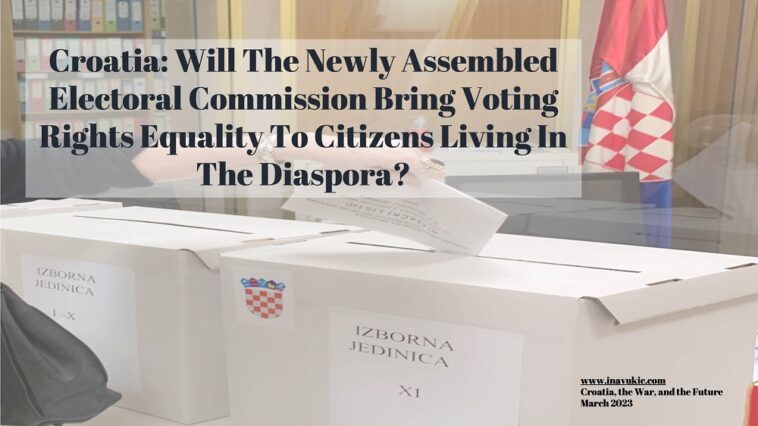And – they’re off!
Bar it’s head or President a brand-new Croatian Electoral Commission has been sworn in on Thursday last week to meet the most challenging electoral year in Croatia’s modern history. The Electoral Commission will soon face a very rare challenge, and that is the next year, 2024, when Croatia will have triple elections: those for members of the European Parliament, those for the Parliament and those for the President of the Republic. To make the year “more interesting” the Parliamentary elections will be operating under the new Electoral law ordered recently by the Croatian Constitutional Court.
After taking the oath that reads – “I swear on my honour that in the performance of my duties as a member of the State Electoral Commission, I will respect the Constitution and laws of the Republic of Croatia and that I will perform my duties conscientiously and impartially”, the new Vice President of the Electoral Commission, Josip Salapic, an officer of the ministry of justice at the time and former Member of Croatian Parliament, stated that the newly elected members, who were elected for eight years, shall perform their duties impartially, honourably and fairly.
Along with Salapic, on March 3, the Parliament elected Vesna Fabijancic Krizanic and new members Slaven Hojsko, Ivana Ljulj Cvitanic and Drazenka Pandeka as another vice president of the Elecotoral Commission.
The swearing-in was also attended by the President of the Supreme Court, Radovan Dobronic, who by law is the President of the Electoral Commission.
As far as the Electorate 11 is concerned, for the diaspora and Croatian citizen voters residing outside of Croatia, let’s hope that the new make-up of the Electoral Commission will follow the footsteps of the Constitutional Court and revisit the voter and representation formula as the Constitutional Court did for the Electorates in Croatia proper. The access to voting booths within the Electorate 11 has been painfully biased and downright discriminatory. That is, in the Bosnia and Herzegovina part of the Electorate 11 voting booths or polling places were many, scattered fairly across the territory, accessible to all voters. In the rest of the Electoral 11 – Canada, USA, Australia, UK, Germany, Austria etc. – polling booths were limited to Embassy or consular Headquarters! This meant that up to 80% of voters could not access the polling booths and cast their votes because of the unreasonable distance and personal cost to the individual voter. The Electoral law does provide for the Electoral Commission to allocate polling places within all Electorates and since 2010, when the Croatian Democratic Union/HDZ government was under Prime Minister Jadranka Kosor, not only were the seats in parliament reduced from 12 to 3 for Electorate 11 but many polling places were also cancelled for accessible community-based clubs and centres and left only to Diplomatic-Consular Headquarters!
So, not only is the representation in the Croatian Parliament severely reduced for Croatian citizens living abroad but their access to polling is grotesquely reduced also. Many would need to take a four-hour plane ride, for instance, to cast their vote at General Elections or any other elections!
The result of such deplorable electoral practices in Croatia is that, for instance, the three seats in the parliament for Croats living abroad are filled with representatives from Bosnia and Herzegovina, because their access to polling places is relatively easy, yielding a much higher number of votes than those from, say, Canada, USA, Australia, Germany… Most Croats in these countries do not even know the names of their supposed parliamentary representatives let alone their needs being represented by them.
Since it is estimated that there is the same number of Croats living in the diaspora, or more, than in Croatia proper, it is to be hoped that the newly assembled Croatian Electoral Commission will revisit its definition of polling places in the diaspora and stay away from the exclusivity of “Headquarters of the Diplomatic-Consular Missions”. What possible excuse can Croatia have not to bring the polling places closer to where the voters are like it does within Croatia! None, except communist mindset as far as I see. Former Yugoslavia communist and their offspring nurtured a particular hatred and intolerance towards the Croatian diaspora because it is mainly made up of Croats who rejected communism and fled to the West from its oppression. That same diaspora was a large contributor to the successful creation of the independent Croatia, exit from communist Yugoslavia. This was justly rewarded by President Franjo Tudjman by allocating 12 seats in parliament to Croats in the diaspora from the start of the Constitution of the new independent Croatia I early 1990’s. It took Tudjman’s death in late 1999 and the subsequent influx of former communists or their indoctrinated offspring into the corridors of power in Croatia to keep chipping away at the Croatian diaspora rights.
All HDZ Governments in Croatia, since 2003, have shouted that their priority is the equalisation of all Croatian citizens in terms of voting rights. But they are a far cry from being equal today and during the past decade, at least. Croatian citizens outside the Republic of Croatia form a large population which, unfortunately, today is not equal to all other Croatian citizens, although it should be. This inequality is not just about the mere three seats in parliament, but also about the polling places, because they (Croatian citizens outside the Republic of Croatia) are actually “disabled from voting”. Access to polling is the very backbone of democracy and the Croatian diaspora has been severely disadvantaged, if not banned from voting given that in so many cases casting a vote at election also means prohibitive financial burden for the voter.
Croatian voting rights are regulated by Article 45 of the Constitution of the Republic of Croatia. According to paragraph 1, ” Croatian citizens over the age of 18 (voters) have general and equal voting rights in elections for the Croatian Parliament, the President of the Republic of Croatia and the European Parliament, as well as in the decision-making process at the national referendum, in accordance with the law.”
Therefore, while the Constitution itself evidently aims to provide for equality of voting rights for all citizens the Electoral Commission’s allocation and definition of voting places had since 2010, particularly, severely discriminated against and removed the equality of those voting rights for Croatian citizens living in the diaspora. The latter in particular since equal voting rights would include equal (or reasonable) access to polling booths. This is the principle that every voter’s vote is equally valid.
The question is often heard whether Croatian citizens who do not live in Croatia should have the right to vote at all. In Croatia, these people say that many Croatian citizens living in diaspora do not pay taxes, do not serve in the army and do not have any other obligations, so it is not logical that they are allowed to decide on something. This is countered by the arguments that voting is the constitutional right of all citizens, that emigrants contribute to the economic progress of Croatia with their enormous remittances and investments, that their right to vote is a form of integration of the homeland and expatriate Croatia, and that because official Croatia is calling for the return of Croats from the diaspora they must be given the right and opportunity to shape that return which is also done via parliamentary representation and voting.
However, the term “Croatian citizens who do not have a residence in the Republic of Croatia” does not only refer to the diaspora, i.e., to those who previously lived in Croatia and then emigrated, but also to those who have never lived in Croatia. According to some data, Croats in Bosnia and Herzegovina make up more than 70 percent of registered voters in the constituency for “diaspora” (Electorate 11).
There is no exact data on Croatian voters in the diaspora. It is clear, however, that the Croatian diaspora is growing and expanding continuously, but still shows little interest in voting at elections for the Croatian Parliament, the President, or European Parliament Member. This is understandable once one looks at the electoral rules and practices via which voters must register beforehand and they can only cast their vote in person at a Croatian consular representation, and that ultimately, they can only elect three representatives.
It seems to me that the newly assembled Electoral Commission in Croatia can much improve access to polling, and therefore equality, in the diaspora by simply redefining the polling places. Failing that, postal and electronic voting would immensely boost the voting equality of Croatian citizens living in the diaspora. The latter has been a topic of much voter pleas for at least a decade, and nothing has been done. One feels that one has been talking into a deaf telephone on this. So frustrating in this age when rights and equality are on every politician’s lips and yet steps towards achieving them are so painful and slow. Not acceptable! Ina Vukic




